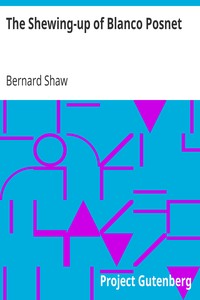The Shewing-up of Blanco Posnet by Bernard Shaw
"The Shewing-up of Blanco Posnet" by Bernard Shaw is a one-act play first produced in 1909. Set in the American West, this religious tract in crude melodrama follows Blanco Posnet, a drunk and reprobate accused of stealing the Sheriff's horse. As the trial unfolds, witnesses testify and secrets emerge about what really happened that night. Shaw's controversial statements about God sparked a censorship battle with British authorities, leading to the play's defiant
premiere in Dublin instead of London. (This is an automatically generated summary.)
Read or download for free
| Reading Options | Url | Size | |||
|---|---|---|---|---|---|
| Read now! | https://www.gutenberg.org/ebooks/5722.html.images | 262 kB | |||
| EPUB3 (E-readers incl. Send-to-Kindle) | https://www.gutenberg.org/ebooks/5722.epub3.images | 171 kB | |||
| EPUB (older E-readers) | https://www.gutenberg.org/ebooks/5722.epub.images | 173 kB | |||
| EPUB (no images, older E-readers) | https://www.gutenberg.org/ebooks/5722.epub.noimages | 159 kB | |||
| Kindle | https://www.gutenberg.org/ebooks/5722.kf8.images | 345 kB | |||
| older Kindles | https://www.gutenberg.org/ebooks/5722.kindle.images | 314 kB | |||
| Plain Text UTF-8 | https://www.gutenberg.org/ebooks/5722.txt.utf-8 | 225 kB | |||
| Download HTML (zip) | https://www.gutenberg.org/cache/epub/5722/pg5722-h.zip | 166 kB | |||
| There may be more files related to this item. | |||||
Similar Books
About this eBook
| Author | Shaw, Bernard, 1856-1950 |
|---|---|
| Title | The Shewing-up of Blanco Posnet |
| Alternate Title | The Showing-up of Blanco Posnet |
| Note | Wikipedia page about this book: en.wikipedia.org/wiki/The_Shewing-Up_of_Blanco_Posnet |
| Credits | Eve Sobol and Distributed Proofreaders |
| Reading Level | Reading ease score: 67.9 (8th & 9th grade). Neither easy nor difficult to read. |
| Language | English |
| LoC Class | PR: Language and Literatures: English literature |
| Subject | Censorship |
| Subject | Horse stealing -- Drama |
| Subject | West (U.S.) -- Drama |
| Category | Text |
| EBook-No. | 5722 |
| Release Date | May 1, 2004 |
| Most Recently Updated | Oct 22, 2023 |
| Copyright Status | Public domain in the USA. |
| Downloads | 525 downloads in the last 30 days. |
| Project Gutenberg eBooks are always free! | |

